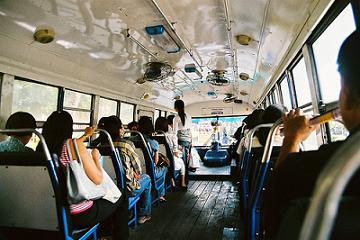“SORRY, WE’RE CLOSED,” said a white person in the lobby of my first hostel as I walked through the door.
“Shit,” I said. The group at the table laughed, all looking at me. One stood and got a beer from the mini-fridge in the corner.

“SORRY, WE’RE CLOSED,” said a white person in the lobby of my first hostel as I walked through the door.
“Shit,” I said. The group at the table laughed, all looking at me. One stood and got a beer from the mini-fridge in the corner.
“Where are you from?” they said. They asked me to take pictures of them with their digital cameras.
I said, “Well, goodnight,” and went to my room. In my room I thought about how I wouldn’t normally hang out with those people if I was in Seattle.
The next day I was sitting on a curb eating a banana pancake. One of the travelers—a mildly obese, sunburned man—turned his body gradually as he passed me. He stopped and looked at me. I looked at him. He moved slowly forward. I wasn’t sure if it was him.
“Good morning,” he said, “is that your breakfast?”
“Hi,” I said.
“I’m going to the Grand Palace,” he said, “where are you going?”
“I’m going to the park down that way,” I said. I didn’t think to ask him if I could come with him before he left. It didn’t occur to me until days later.
That night in a new guesthouse in the Silom area I was ordering large Changs at the bar and moving back to a table where I sat alone. If I sat there long enough I thought someone would approach me. A group of three Americans appeared and interacted with each other as if they had been friends for years. Eye contact was not established with any of the members of the group. I ended up in the corner on a couch writing in my notebook until the bar closed. The next morning the bartender, who also worked the reception, saw me and said “large Chang” and grinned.
The following night in the same guesthouse bar I was at a table where a lot of people sat drinking. I was seated across an English girl.
“Where are you from,” I said.
“How long have you been traveling for, and when will you go back,” she said.
“Where have you been since you started traveling,” I said, “and long have you been traveling?”
“You’re from the States, right,” she said, “where in the States?”
“Oh, you’re from Seattle? My cousin lives there,” the person next to me interrupted.
“Yes,” I said. “And where are you from?”
“England,” the new person said.
“I thought so,” I said. “I have such a hard time lately telling if people are English or Australian. Sometimes I even think Germans are English. One time I met this guy from London and I thought he was German for like two days. It was very strange.”
“I have such a hard time telling the difference between Americans and Canadians,” the new person said, “that I just ask if they’re Canadian because I don’t want to offend them.”
“But you guys have Obama now so it’s okay,” the English girl said
“Obama is very good,” the new person said.
“Obama is a lot better than George Bush,” the English person said.
“Yes,” I said.
“You must have been embarrassed to be an American when George Bush was president,” the new person said.
“No, I wasn’t,” I said.
“All the Americans I have talked to have been very embarrassed about George Bush,” the new person said.
“I don’t think I was embarrassed,” I said.
“But you must have been embarrassed,” the English said. “I was embarrassed that we were both a member of the same species.”
“I was embarrassed for the Americans,” the new person said.
“No, I wasn’t embarrassed,” I said.
“Do you like George Bush,” the English said.
“I do not like George Bush,” I said.
“Then, truly, you must have been embarrassed to be an American,” the new person said.
“If a person generalizes my personality or how ‘good’ I am based on my nationality, or who presides over the country in which I was born,” I said, “then that person is no better than George Bush, or even Nazis. Nazis generalized personality and how ‘good’ people were based on religion and then killed a lot of them. In Rwanda genocide happened because people were judging other people’s intellectual characteristics based on what tribe they came from.
“I never felt embarrassed because if a person judged me for being American and subsequently didn’t want to be my friend, I wouldn’t want to have that person as a friend, so I remained unaffected.”
The new person turned to the position she was in before she interrupted. I turned back to the English.
“So, what do you do for money,” I said.
The next morning at the reception we saw each other and she made a small wave then turned her face.
“Your bed’s infested,” I said that day to a Canadian girl that had just come in and put her bags down on one of the bunks. “That was supposed to be my bed, but someone told me there were bedbugs, so I moved to this bed. . . You should change beds.”
Later I had the same conversation with her that I had the night previous with the English, minus the genocide speech.
That night we went to the Loi Krathong festival together. We ended up back at the guesthouse on the balcony talking to two English people who gave me a lot of information about what to do in Cambodia.
The next day I went to Cambodia.
Brandon recently published an Analysis of the Typical Traveler Conversation. For more of his narrative writing, please check out this story at Muumuu House.